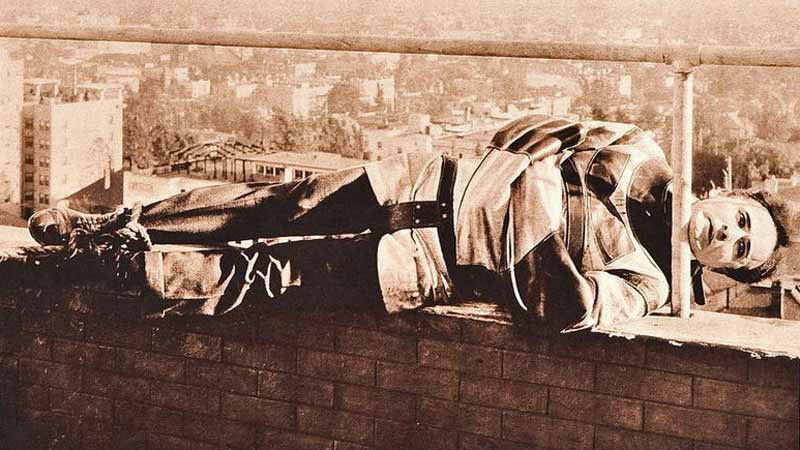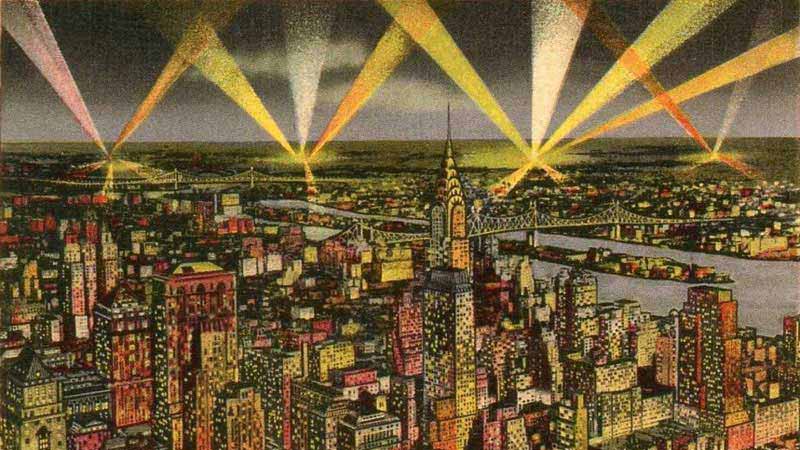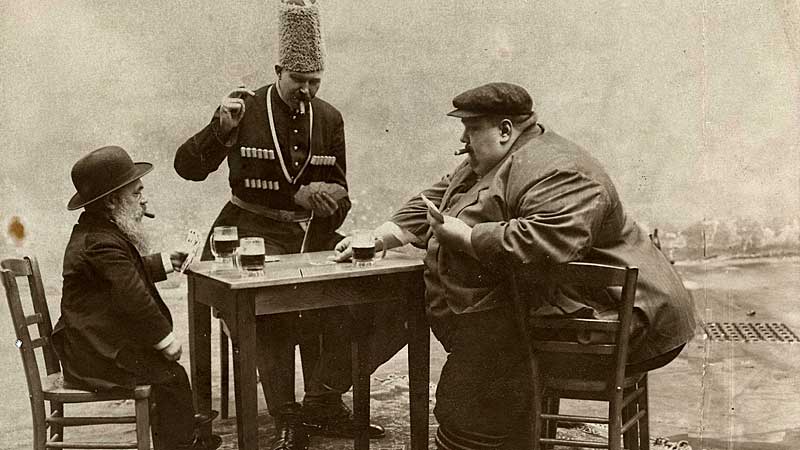Neil Tobin's "Creating a Magic Show to Capture a Wider Audience" Podcast Interview
by Christian Painter and Roland Sarlot
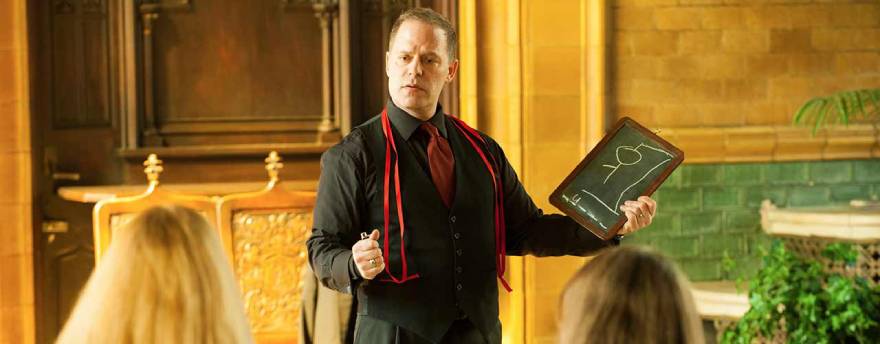
What We'll Explore
Neil Tobin shares how he creates different theater shows that garner much greater marketing visibility by positioning the shows not as magic shows. His methods created a much larger interest from the press, established himself as an authority in his community, and gave his shows a much richer foundation to create theater.
Who is Neil Tobin?
Neil Tobin is the producer, playwright, and performer behind Supernatural Chicago, a theater show that ran every week for 10 straight years and named one of the top 10 things to do in Chicago and has appeared on Ghost Adventures on the Travel Channel, Dead Famous on Biography, Forbidden History on the Science Channel, and the DVD release of Michael Keaton thriller White Noise. In the magic and mentalism community, he's known for creating original performance material and sharing it through trade publications and major distributors.
Running Time:
The following interview has been edited and condensed for clarity.
What you can do
You are welcome to share up to 500 words of the below transcript in a non-commercial purpose provided you credit and link back to our site like this: "The Magic Oracle Business Podcast".
The Interview
Christian Painter: In this episode of the Magic Business Podcast...
Neil Tobin: I specifically don’t want a show that’s even billed as a magic show. The show that I ran for 10 years attracted people who were into the paranormal as a subject. It attracted believers, it attracted skeptics, it attracted people who were into storytelling and experimental theater. Yes, it also attracted magic fans and it attracted out-of-towners who want to know about Chicago history. That’s a much bigger swath than just going after magic fans.
Christian Painter: Welcome to the Magic Business Podcast, where we share insightful and delightful inner secrets about the business of magic. This is where magic professionals present their real-life experiences and some of their most guarded secrets to help further your career in the magical arts. I’m your host, Christian Painter, in partnership with the MagicOracle.club, where you can hear all of our Magic Business podcasts.
Neil Tobin is the producer, playwright, and performer behind Supernatural Chicago, a theater show that ran every week for 10 straight years. It was named one of the top 10 things to do in Chicago by TripAdvisor. Other theater productions he has written, produced, and performed in Chicago include The Houdini Seance, Palace of the Occult, and Near-Death Experience.
National appearances include Ghost Adventures on the Travel Channel, Dead Famous on Biography, Forbidden History on the Science Channel, and the DVD release of Michael Keaton thriller White Noise. In the magic and mentalism community, he’s also known for creating original performance material and sharing it through trade publications and major distributors. Please welcome Neil Tobin.
Neil Tobin: Thanks, Christian. Good to be here.
Christian Painter: Hey, I’m excited. Now I have seen your shows, I have seen three different shows of yours. One of the things that I found interesting was none of those shows was a magic show, or at least they’re not built like a magic show. That’s really what I want to talk to you about. So tell me about that.
Neil Tobin: When I do my work, I’m not really interested in that. From a business standpoint, I specifically don’t want a show that’s even billed as a magic show, because, bottom line, magic fans are a really small market, if you’re going to build yourself as a magic show and you’re not a family show, you’re not doing Saturday matinees and looking specifically for family crowds.
Well, it isn’t really something that... It isn’t a market that I’m going after. I think it’s much more interesting to go after a much larger market than that. To use one of my shows as an example, the show that I ran for 10 years in an extensively haunted nightclub in Chicago, it was called Supernatural Chicago.
That show, because it wasn’t billed as a magic show, it was actually a show about Chicago paranormal history that use magic as an interactive device to get people into the storytelling, that show attracted people who were into the paranormal as a subject. It attracted believers, it attracted skeptics, it attracted people who were into storytelling and experimental theater.
Yes, it also attracted magic fans and it attracted out-of-towners who want to know about Chicago history. So that’s a much bigger swath than just going after the people who are self-identified magic fans.
Christian Painter: Any magician who went there would’ve said, oh, yes, you’re doing magic tricks. We understand that but to the audience, I don’t think they saw it as magic tricks. They saw it as the vehicle that you were tearing the narrative of the ghost shows, correct?
Neil Tobin: Exactly right. In all my shows, that’s how I try to use the magic and mentalism, not just, “Hey, here’s a cool thing." So I don’t write shows about magic.
Christian Painter: Understood. Now not only did that help you in the marketing, because, as you say it, it’s not a magic show now. So I don’t know, it’s a show about ghosts, so I’m going to come to that, because many people have an interest in ghosts, especially if it’s Chicago-specific where you live. But how did that work for the marketing? You’re not marketing a magic show, so how did you market it specifically?
Neil Tobin: I got into the theater listing as a theater show.
Christian Painter: Was anyone ever disappointed when they got there and goes, “Oh, it’s just a magic show"?
Neil Tobin: It wasn’t just a magic show. The magic and mentalism that I was using really took up 50% of the playing time. The rest of the time was straight up storytelling. One of the pieces of advice that I got from Eugene Burger when he had seen the show was that I shouldn’t have to feel that every story needed magic even because the strength of the storytelling was such that that wasn’t necessary.
Christian Painter: And I’m sure many people, after the show, shared ghost stories with you.
Neil Tobin: Oh, every time, and that was one of the greatest compliments I could receive after a show. Here I’ve spent in excess of 60 minutes, closer to 90 minutes, telling stories about ghosts and such. After the show, here are all these people who sat through all of that, and then they wanted to tell me their stories. It was fantastic.
Christian Painter: And on top of that, I would say, in Chicago then, you didn’t get known as, oh, he’s the magician. You got known as here’s the expert on paranormal activity in Chicago.
Neil Tobin: Well, yeah. I mean there were other experts of paranormal activity in Chicago. I mean several others were experts too.
Christian Painter: But you were one of them….
Neil Tobin: That’s true. Yeah. In fact, I considered it at the time an accomplishment to actually be invited on a show and not be asked to do magic but just to be interviewed as an expert on the paranormal.
Christian Painter: Now you’ve positioned yourself differently in the magic market. This means you don’t really have any competition in that regard.
Neil Tobin: Right. I mean people will have asked, “Are you a magician? Are you a mentalist?" I bill myself when I perform as a necromancer, which is a category containing one person.
Christian Painter: Okay.
Neil Tobin: So that does cut down on competition.
Christian Painter: But you make a habit of this, in that your other show, Near-Death Experience, also was it not a magic show not about magic, correct?
Neil Tobin: Correct. It’s about our evolving relationship with mortality.
Christian Painter: Yeah, keep going.
Neil Tobin: That’s pretty heavy stuff.
Christian Painter: Yes, it’s very heavy.
Neil Tobin: Well, it’s interesting. I mean I had done Supernatural Chicago, and then I did a completely different show that was a historical show about a European psychic, who I was very interested in, Erik Jan Hanussen. Then I wanted to go back and write another show, but I didn’t want it to be just Supernatural Chicago Part Two.
And so, I thought about, well, why are we interested in ghost stories? Why do we tell these things? I looked deeper at it, and it’s really a way for us to laugh at, come to terms with, make fun of our own fear of death in some way. So why not look at that?
So I wrote a whole show about this specifically American evolution of just the dance we have around mortality. It took shape and I wanted to do it in an interesting and appropriate locale. So I was able to do it actually at a historic chapel in one of the oldest cemeteries in Chicago.
Christian Painter: I saw the pictures of that, and it looked fabulous.
Neil Tobin: Oh, it was a breathtaking building to be able to perform in. It’s usually closed to the public. They only open it for specific private occasions. That they asked me to perform there was just unbelievable. I did a spring run there in 2018 and they asked me back for the fall, so I did it again.
Christian Painter: So now your third show, Hanussen, tell me about that one.
Neil Tobin: The name of that show is Palace of the Occult. That was a historical biography of the most famous psychic entertainer in Europe in the early ‘20s and ‘30s. He was a fascinatingly gray individual. He was very ambiguous in that was he real or was he not as a psychic? Was he a member of the upcoming Nazi party or was he secretly Jewish?
There were lots of questions about this guy. He, as a story in the United States, is less well-known than, say, in Germany. I thought it was a great opportunity to shed some light on what is a largely untalked about chapter in World War II history.
Christian Painter: And what was fascinating about the show is you go through this guy’s life and we see the struggle... Not only is there magic and the magic is good, but you’re left pondering some questions yourself, right?
Neil Tobin: Right. Well, and because it isn’t a show about magic, because it’s a show about an actual human being who has importance within the context of Holocaust history and World War II history. This was a show that I could absolutely see bringing to perform in areas like Holocaust museums, for example, areas that attract a large number of people who have an interest in that subject. So it isn’t just, once again, “Hey, I want to see a magic show."
Christian Painter: Right. You’ve had people actually approach you about, “Hey, can we take this in this direction?"
Neil Tobin: Well, right. Right. I mean it’s an honest to God two-act play with a real narrative arc. The fact that I also, in the context of that show, get to do material out of Hanussen’s repertoire is frosting on the cake.
Christian Painter: I think what’s interesting about your shows is, first of all, we’re looking at the subject. So you create a subject that’s not magic, whether it’s the Paranormal Chicago or what our relationship with death is, then this World War II narrative. And so, we’re already in because that’s interesting itself. Then you find out, “Oh, cool. There’s some cool magic or special effects in this show." So you have a double hit with them, don’t you?
Neil Tobin: Exactly right. Exactly right. On a personal standpoint, I like being able to push what we do in that direction because it makes people view what we do as magical performers in the context of theater, instead of just, “You’re a magician. Do magic for me monkey boy." It isn’t that sort of situation. I just love being able to push in that direction.
Christian Painter: Give me your thought process when you’re sitting back and you’re thinking, “All right, I want to write a show." Where do you come from first? What’s your first thoughts in putting these shows together?
Neil Tobin: My starting point, well, is just to expose myself to everything around me that might spark an idea. I just try to be open to things. I read books, I look at art, I watch movies, and listen to podcasts. You just never know when something is just going to make a light bulb go off above your head and make you say, “Oh, wait. There’s something in that. I could do something with that."
I mean the first Hanussen biography that I opened up, I was in the middle of doing Supernatural Chicago at the time. I wasn’t really looking to write another show. I had heard about this guy and I found a biography of him and I opened it and I started reading it. I’m probably no further than 10 pages in when I said, “Oh god, this has got to be my next show."
Christian Painter: I liked that because I think too many times magicians only think of, “Let me design my next show around this parade of tricks that I’m going to have. I have a new trick, so that’s a new show," as opposed to giving the show some texture.
Neil Tobin: Well, if you start from the narrative, rather than starting from a trick, you’re more likely to then be able to evolve magical repertoire that’s specific to that show and maybe something that you’ve never seen before.
Christian Painter: If I could underline stuff in an audio recording, I would underline the sentence you just said, which is so important, I think, to making a show more than just a parade of tricks. That’s fantastic. Not only do you have to put together this unique show but now they’re so unique, you have to find unique venues for them. How do you do that?
Neil Tobin: Well, just to give your listeners a little context. Supernatural Chicago took place in this big... It looks like an old castle. It’s this big Romanesque structure at the turn of the last century, dark granite, crenelated building. It looks terrifying. In fact, they dialed it up for Halloween gorgeously. It immediately set the tone when people arrive. You just feel the sense of ominousness before you walk in. And to go from that-
Christian Painter: Yes, yes, yes. So you went into this and you could tell it was an older style building and what was great is when you came in, then you went kind of downstairs. That’s always when the hairs go, “Oh, we’re going downstairs to the basement. Okay." You sat down, you’re already in that feeling of like... It was definitely not a traditional theater space but it fits the show perfectly.
Neil Tobin: And it had a dance floor and there were aimable lighting instruments. It had a sound board. So I was able to hook up background music and I was able to aim instruments so things were lit, and we set up 50 chairs in a semicircle around the dance floor area and lit a bunch of candles, and we’re set.
Christian Painter: You didn’t get to feel that you were in a theater space, as much as you felt like you were sitting around getting ready to hear some creepy stories. As you talked about, you had a sound board and all that. That was not noticeable at all to anyone who was sitting there. You didn’t have that feeling of a production. You had a feeling like this is creepy and that guy’s going to be telling me creepy stuff.
Neil Tobin: Right. The underscoring was subtle. But to answer your question, how does one obtain an unconventional space to perform in and why do you want an unconventional space to begin with?
Christian Painter: That is exactly the question I was asking, yes.
Neil Tobin: So why one would want an unconventional space? For me, I love doing site-specific theater, in that if your site can impart an authentic sense of, well, history related to whatever it is you’re trying to present, hopefully something that relates to your narrative. If your site reflects that in some way, your audience can feel that, your audience senses that, and the mood is set before they’re even inside.
That can’t even hold a candle to even the best constructed theatrical space where you’re creating a set. I mean the audience knows that that’s artifice. So whenever I can, I love using actual environments. It just gives credibility to the theater that you’re creating.
Christian Painter: Supernatural Chicago ran for 10 years.
Neil Tobin: Yes.
Christian Painter: That’s a very long time. What’d you learn?
Neil Tobin: I learned that that was a really long time.
Christian Painter: But people would love to have a show run that long.
Neil Tobin: Oh, it was great and I really loved it, but as a performer... And I have a confession to make. I do not just perform for a living. I do other things, too. And so, I have the rare luxury of being able to say, “I’ve done artistically about all I can with this property. I’m ready for another challenge." So I can afford to just hang it up.
Christian Painter: That was quite the shock for me, to be honest with you.
Neil Tobin: And after 10 years, I did.
Christian Painter: I was quite shocked.
Neil Tobin: Well, sure. But I was ready to try something else. But what did I learn? I learned... Well, and it goes back to being able to market and promote. When you have a new show, it’s newsworthy, and particularly if you’ve done a good job making it’s unlike anything else. I mean I could bill it as here’s a spooky show by a necromancer in a haunted nightclub. Yeah, okay, and you’ve got an article.
But to sustain interest after that initial hit is hard. Coming to terms with the idea that to be newsworthy is an ongoing process, I had to really look at the calendar and rack my brain. So how can I spike it? What can I do for an ongoing source of newsworthiness in the show? Are there were major holidays that I can key into in some way, so that I can send out a press release and get noticed for it? When’s the show’s anniversary so we can celebrate and make a big deal out of it… send out a press release?
Every time a Friday the 13th rolled along, my show was on. We gave out cupcakes to the audience every Friday the 13th. Devil’s food, of course. The pictures of me with cupcakes with little skulls on them and me with a big knife ready to cut it, those were gold.
Christian Painter: This podcast resides on the MagicOracle.Club and at this moment, you are the magic oracle, Neil. So if someone came to you and they’re trying to figure out how to do the narratives and the things that you’re doing, even for me during this interview it’s been tough for me to sometimes construct some of the questions that I really want to ask you because you’re in such a unique product. What’s the question that you would like people to ask, but they never do?
Neil Tobin: I would love for magicians to ask me why they shouldn’t do magic.
Christian Painter: Wow!
Neil Tobin: I’ll explain. In my own development as a performer, I started as a kid and probably nine out of 10 people who are listening to this thing, if not more, were performing as kids, were doing magic when they were children and just never stopped.
I was a boy magician. Then I hung it up and did not touch it throughout high school, throughout college. Then I came back to it. I rediscovered it after college.
I found that break to be crucial to my development as a performer, because that period of time allowed me a chance to gain a fresh perspective on what magic performance was all about, who I was as a person, what I wanted to get out of it. It gave me a chance to look at the old material I was doing and hate it.
Christian Painter: We know that feeling.
Neil Tobin: Yeah. Then figuring out why I hated it, figure out what I would like and where I wanted to go as a performer from that point on. During that big break, I learned lots of other things that changed that perspective. It wasn’t just time. I mean it was also learning theater and being in plays and seeing what theater can do and making art and learning music.
I mean reading lots of books, all these other avenues of education that changed my perspective, so that when I came back to magic, I saw it with a completely different set of eyes and was able to create material that hadn’t existed before.
And so, what I would say as the Oracle to other folks is if it is at all economically possible for you, set a time... I mean it doesn’t need to be four, six, or eight years. It could be a month, it could be a few weeks. But whatever it is, take some time off where you don’t touch magic at all.
Don’t read a book about it. Don’t play with any of your tricks that you know. Don’t read up on the new ones. Ignore the emails from the magic shops that want to sell you new ones. Just follow some other paths. Hopefully, after that, you can come back and be fresh and attack your work in a new way.
Christian Painter: I think people are going to listen to this podcast and evaluate maybe how they’re approaching their show, not only from the aspect of making their show richer but that is going to set them aside marketing-wise. Thanks so much for being on the show, Neil.
Neil Tobin: It was a pleasure. Thank you, Christian.
Christian Painter: Thank you for listening to our Magic Business Podcast. Please visit the MagicOracle.Club, where you can hear all of our Magic Business podcasts and enjoy a vast array of additional magical knowledge. Now if you’re having a rough day, I want you to keep this in mind. Every problem is a gift, because without problems, we would not grow. As always, we at the Magic Oracle wish you continued success on your path in the magical arts.
A Jolly Genie?
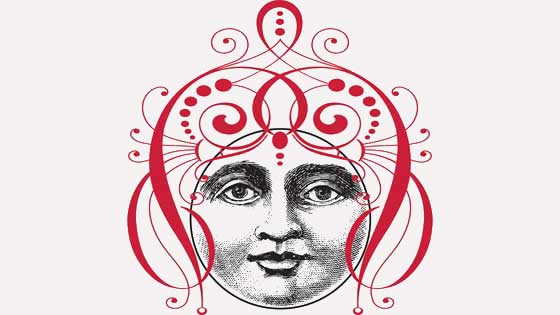
The Magic Oracle is a FREE site but I still must pay dastardly server fees! Please, donate ANY amount... $1, $5, $10, why not $1 million?
THANK YOU for keeping magic alive... and me, a Jolly Genie!

